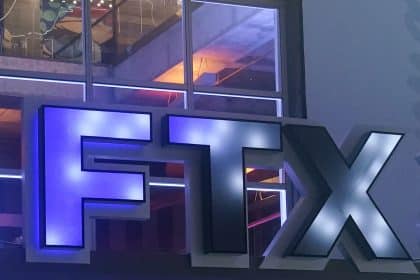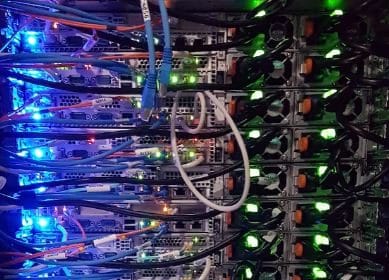Bitcoin Miners Flocking to Texas for Cheap Energy May Bring Grid Problems

AUSTIN, Texas — Texas’ alluring low energy costs are drawing bitcoin miners from out of state despite the vulnerable condition of the electrical grid.
Cryptocurrency mining is an energy-intensive process in which new cryptocurrencies are entered into circulation by using sophisticated computer hardware to solve complicated computations and saving them to a blockchain ledger. If the technology and power supply are available, one can “mine” cryptocurrency without having to put any money down in the process.
Gov. Greg Abbott and Sen. Ted Cruz, R-Texas, have publicly encouraged crypto miners to come to the state on numerous occasions, even as recently as last month when Cruz spoke at the Texas Blockchain Summit in Austin. During the event, Cruz said that bitcoin mining’s ability to be turned off in times of energy crisis makes it simple to offload energy back onto the power grid when needed and grants the potential to strengthen the state’s energy infrastructure.
“If you have a moment where there’s a power shortage—whether it’s a freeze or some other natural disaster where power capacity generation goes down—that creates the capacity to instantaneously shift that energy to put it back on the grid,” Cruz said. “If [crypto miners are] connected to the grid… they become excess reserves that can strengthen the grid’s resilience by providing a significant capacity of additional power to be available for critical services if and when it’s needed.”
Texas provides a 10-year tax abatement, sales tax credits and workforce training to prospective crypto miners, according to a report by Data Center Dynamics. Texas also boasts some of the cheapest sources of energy in the world because of its deregulated landscape, including the cheapest utility-scale solar power production in the United States at 2.8 cents per kilowatt-hour.
In around five years’ time, Cruz said he expects to see a substantial shift in the magnitude of crypto mining due to its significant potential for economic prosperity. In June, Abbott signed into law a legal framework for cryptocurrencies and blockchain that amends the Texas Uniform Commercial Code that formally defines virtual currencies and sets up a legal environment for individuals and businesses to undertake crypto investment.
“The Texas grid will be stronger [and] more resilient as a result of flexible loads like [bitcoin] mining that generates demand but can turn off in seconds during peak demand,” Lee Bratcher, president of the Texas Blockchain Council, said on Twitter in October after meeting Abbott in the governor’s mansion in Austin.
Abbott and Cruz’s enthusiasm for making their state a hotbed for bitcoin hinges on its ability to stave off widespread power outages like the rolling blackouts experienced in February as a result of Winter Storm Uri. At the end of the Texas legislature’s regular session in June, Abbott enacted two bills to enhance the state’s energy infrastructure.
The bills mandate an assortment of upgrades to the power grid, such as upgrades for transmission lines to better endure extreme weather events, inspections of power facilities to determine their resiliency and the introduction of penalties of up to $1 million for power plants that fail to weatherize their generators. However, the natural gas fuel companies that supply power plants will only be required to weatherize if regulators determine they must and the bills lack requirements to improve consumer infrastructure like residential pipes and houses.
Further, proposals to fund backup power generation and improvements for critical facilities like hospitals and nursing homes as well as funding to help pay for the upgrades were removed from the legislation during the House and Senate negotiations. The Electric Reliability Council of Texas, or ERCOT, published a report last week that found the state’s grid is still in poor condition to withstand weather conditions less severe than those the state saw in February.
ERCOT predicted in its report that the state would have to produce at least up to 5,000 additional megawatts of electricity by 2023 to support crypto mining and data centers, which already consume around 1,000 megawatts of electricity in Texas. Another assessment by the North American Electric Reliability Corp., a nonprofit regulatory authority, found that Texas’ pipeline natural gas supplies and power stations are still unprepared for frigid weather conditions which could lead to a capacity deficit as high as 37%.
“Now, ERCOT is telling us that our grid is just as shaky as ever going into the winter weather—and that it will take less than a storm like February’s to send our grid into collapse,” Texas Democratic Party Chair Gilberto Hinojosa said in a written statement. “Abbott has had 10 months and four legislative sessions to fix our grid in time for winter. He’s had every opportunity to take meaningful action and keep Texans safe from future disasters. He made the choice not to—and that choice tells us everything we need to know about where Abbott’s priorities lie.”
Hinojosa continued, “Abbott has already made a million dollars off his big energy donors in exchange for leaving our grid—and Texans—vulnerable.”
Reece can be reached at [email protected].

























